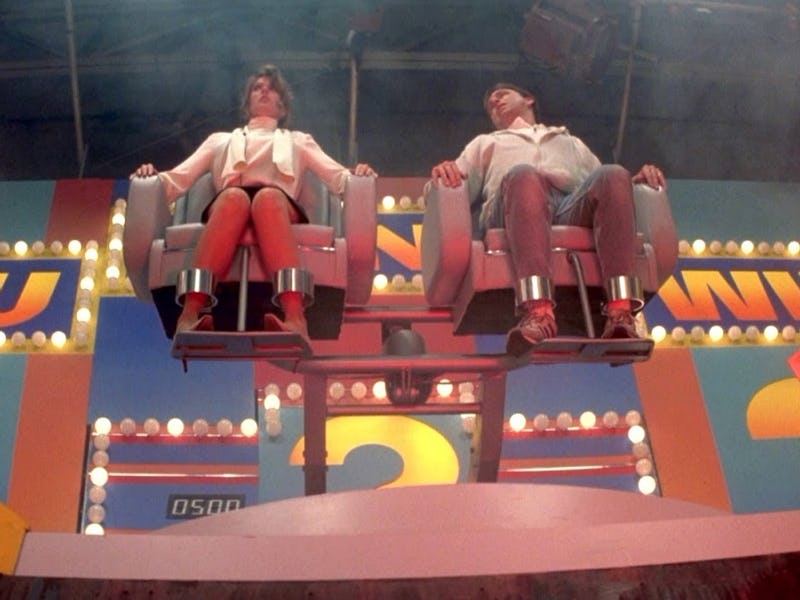30 years ago, a sci-fi flop beat Marvel to its smartest story idea
Once dismissed as unremarkable, this send-up of ‘90s television now looks disturbingly prescient.

WandaVision received near-unanimous praise for its metafictional journey into the annals of American TV. But viewers old enough to get all its references — particularly those who grew up during Blockbuster’s heyday — may well have remembered that a flop John Ritter sci-fi satire explored several decades earlier.
Celebrating its 30th anniversary on August 14, Stay Tuned is both a much darker and much sillier experience than the post-modern adventures of Vision and Wanda Maximoff. Writers Tom S. Parker and Jim Jennewein pitched the film as The Evil Dead meets Monty Python, and although the VHS staple doesn’t exactly reach those lofty heights, it remains an entertaining and surprisingly prescient poke at small-screen culture.
Ritter plays Roy Knable, a disillusioned middle-aged plumbing supply salesman whose means of escaping his humdrum existence has turned into an unhealthy obsession. “They say the average American watches seven-and-a-half hours of TV a day,” notes tech whizkid son Darryl (David Tom). “If that's true, there are two guys who never watch, and my dad took their times.”
Casting the ever-likable Ritter was a genius move, as was selecting Pam Dawber as his frustrated wife, Helen. Both were synonymous with classic ‘70s sitcoms, the former the third in Three’s Company and the latter the human love interest of Robin Williams’ extraterrestrial in Mork and Mindy. There’s something exciting and subversive about seeing people who embody feel-good comfort television having to battle their way through a gauntlet of sadism.
Their survival challenge begins when Spike (Jeffrey Jones), a representative of Satan, turns up at Roy’s doorstep to offer him every couch potato’s ultimate dream: A satellite system beaming 666 channels into a “brand new 50 inch 4K resolution high-definition LCD flatscreen TV.” Ignoring the devilish red flags and the ire of his spouse, Roy signs up to be greeted by such nightmarish parodies as “Three Men and Rosemary’s Baby,” and a candid camera series where an elderly woman is wrongly informed her husband is dead.
The Knable family in a rare moment away from the TV.
In 1992, Stay Tuned was accused of failing to say anything substantial in its send-up of America’s TV addiction. But decades on, the film serves as a forewarning of the dark route TV went down. The prank show genre, for example, has gone to such extremes as staging fake ISIS abductions and simulating plane crashes. The macabre spoof “Autopsies of the Rich and Famous” pretty much become a depressing reality.
Alongside ads for warped products such as The Silencer of the Lambs (muzzles for annoying youngsters) and Yogi Beer (alcohol for kids), and an end-credits sequence that zips through teasers for “Beverly Hills, 90666,” “The Golden Ghouls,” and “I Love Lucifer,” these brief side gags only appear via the Knables’ new-fangled TV set. But most of Stay Tuned’s lampoons play out in full screen, with Roy and Helen front and center after the new satellite dish zaps the bickering pair into Hellavision.
Helen (Pam Dawber) and Roy (John Ritter) in a warped version of The Maltese Falcon.
That’s where the fun really starts. Producers had initially offered Tim Burton the director’s chair, but were forced to look elsewhere once Batman Returns came calling. The darkly comic, dystopian world built by replacement Peter Hyams, now best-known for collaborating with Jean-Claude Van Damme on Timecop and Sudden Death, could still pass as the gothic master’s.
There are definite shades of Burton’s ghoulish aesthetics in Stay Tuned’s take on Dana Carvey and Mike Myers’ SNL favorites, “Duane’s Underworld,” and Jeffrey Jones’ role as the maniacal villain feels like it was secured thanks to his memorable turn in Beetlejuice. Accompanied by Eugene Levy as his sniveling assistant, the now-disgraced actor oozes mustache-twirling menace as the chief of a network that would take “torture porn” as a compliment.
Operating from an underground lair that boasts signs such as “Remember Today Is Saddam Hussein Appreciation Day,” Hellavision puts its unwilling guests through an exhausting game of do-or-die purely for the entertainment of the Devil. Make it to 24 hours and you’re free to return to the real world. Succumb to one of the many deadly traps – one poor woman is trampled by Godzilla – and your soul is doomed to Hell for eternity.
You really don’t want to lose this game show.
It’s a wonderfully zany premise that allows for parodies of everything from Northern Exposure (“A story of a young doctor from New York who comes to Alaska, complains about everything, and freezes to death”) to Looney Tunes (an inspired Chuck Jones sequence which turns the two heroes into animated mice). Then there are original concepts such as “You Can’t Win,” a perverse quiz show where losers plummet into a deadly pit, and “Off With Their Heads,” a French Revolution drama whose title nearly turns literal.
Both leads throw themselves into all the madness. In the space of about three minutes, Ritter becomes a test crash dummy, revisits his Three Company’s past, and is forced to impersonate Prince in a precarious Salt-N-Pepa video which essentially determines the pair’s fate. And while Dawber has to play the damsel-in-distress in the western finale, her character is far more capable than her husband. It’s Helen who comes to the rescue in the mixed pairs wrestling, and who realizes how to thwart Beelzebub once and for all: Press their remote control’s off button.
It’s a shame that both critics (47% on Rotten Tomatoes) and cinemagoers (it grossed less than half of its $25 million budget) essentially did the same. Stay Tuned might lack the gravitas and emotional heft of WandaVision, but its committed performances and unabashed daftness mean it’s an equally enjoyable ride.
This article was originally published on